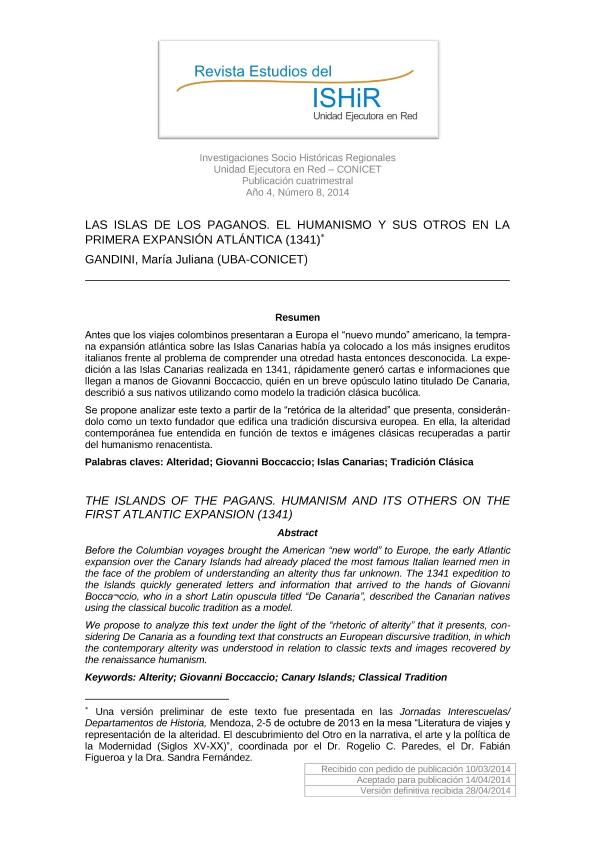Mostrar el registro sencillo del ítem
dc.contributor.author
Gandini, María Juliana

dc.date.available
2019-12-17T19:18:02Z
dc.date.issued
2014-05
dc.identifier.citation
Gandini, María Juliana; Las islas de los paganos: El humanismo y sus otros en la primera expansión atlántica (1341); Investigaciones Socio-Históricas Regionales; Estudios del ISHiR; 4; 8; 5-2014; 21-36
dc.identifier.issn
2250-4397
dc.identifier.uri
http://hdl.handle.net/11336/92404
dc.description.abstract
Antes que los viajes colombinos presentaran a Europa el “nuevo mundo” americano, la temprana expansión atlántica sobre las Islas Canarias había ya colocado a los más insignes eruditos italianos frente al problema de comprender una otredad hasta entonces desconocida. La expedición a las Islas Canarias realizada en 1341, rápidamente generó cartas e informaciones que llegan a manos de Giovanni Boccaccio, quién en un breve opúsculo latino titulado De Canaria, describió a sus nativos utilizando como modelo la tradición clásica bucólica. Se propone analizar este texto a partir de la “retórica de la alteridad” que presenta, considerándolo como un texto fundador que edifica una tradición discursiva europea. En ella, la alteridad contemporánea fue entendida en función de textos e imágenes clásicas recuperadas a partir del humanismo renacentista.
dc.description.abstract
Before the Columbian voyages brought the American “new world” to Europe, the early Atlantic expansion over the Canary Islands had already placed the most famous Italian learned men in the face of the problem of understanding an alterity thus far unknown. The 1341 expedition to the Islands quickly generated letters and information that arrived to the hands of Giovanni Bocca¬ccio, who in a short Latin opuscula titled “De Canaria”, described the Canarian natives using the classical bucolic tradition as a model. We propose to analyze this text under the light of the “rhetoric of alterity” that it presents, considering De Canaria as a founding text that constructs an European discursive tradition, in which the contemporary alterity was understood in relation to classic texts and images recovered by the renaissance humanism.
dc.format
application/pdf
dc.language.iso
spa
dc.publisher
Investigaciones Socio-Históricas Regionales
dc.rights
info:eu-repo/semantics/openAccess
dc.rights.uri
https://creativecommons.org/licenses/by-nc-sa/2.5/ar/
dc.subject
ALTERIDAD
dc.subject
BOCCACCIO, GIOVANNI
dc.subject
ISLAS CANARIAS
dc.subject
TRADICIÓN CLÁSICA
dc.subject.classification
Historia

dc.subject.classification
Historia y Arqueología

dc.subject.classification
HUMANIDADES

dc.title
Las islas de los paganos: El humanismo y sus otros en la primera expansión atlántica (1341)
dc.title
The islands of the pagans: Humanism and its others on the first atlantic expansion (1341)
dc.type
info:eu-repo/semantics/article
dc.type
info:ar-repo/semantics/artículo
dc.type
info:eu-repo/semantics/publishedVersion
dc.date.updated
2019-10-28T14:33:09Z
dc.journal.volume
4
dc.journal.number
8
dc.journal.pagination
21-36
dc.journal.pais
Argentina

dc.journal.ciudad
Rosario
dc.description.fil
Fil: Gandini, María Juliana. Unidad Presidencia. Gerencia de Recursos Humanos. Dirección de Des.de Rec.humanos. Coordinación de Becas; Argentina. Universidad de Buenos Aires. Facultad de Filosofía y Letras. Museo Etnográfico "Juan B. Ambrosetti"; Argentina
dc.journal.title
Estudios del ISHiR
dc.relation.alternativeid
info:eu-repo/semantics/altIdentifier/url/http://web2.rosario-conicet.gov.ar/ojs/index.php/revistaISHIR/article/view/322
Archivos asociados
